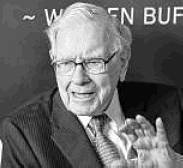Commentary
Wealthy should pay taxes like rest of us
CHRIS TOMLINSON
Give Warren Buffet some credit: He has always complained that his secretary pays a higher percentage of her income in federal taxes than he does.
He just never told us how much more.
The investigative news outlet ProPublica revealed last week that Buffet paid $23.7 million in taxes between 2014 and 2018 when he collected income of $125 million while his total wealth grew by $24.3 billion. That’s an effective tax rate of 0.1 percent, when Americans who earn salaries or wages of $70,000 a year typically pay more than 14 percent.
Past presidents and Congresses have created a system that only collects taxes when money is earned from an employer or from selling an asset, perhaps a stock, bond or commodity. The wealthy can watch their net worth rise year after year and never pay taxes on their gains if they never sell.
Most Americans, though, live paycheck-to-paycheck. They end up paying more of their income and wealth in taxes than those who can hoard profits in brokerage accounts.
Good accountants can also make a difference. Amazon founder Jeff Bezos reported $4.22 billion of income between 2014 and 2018 and paid $973 million in taxes, according to ProPublica.
But he still escaped the highest tax rate under U.S. law, and it’s a pittance compared to the $99 billion he added to his personal assets from rising stock prices, dividends and other investments.
The U.S. tax system hasn’t always punished the poor and middle class while benefiting the wealthy. The movement to shield the rich from paying their fair share began with President Ronald Reagan, who incorrectly claimed that lowering taxes on the wealthy would generate higher tax receipts in the long run.
Repeat after me: Lower tax rates do not increase economic activity enough to generate higher tax revenues. The Laffer Curve is a laugher that never worked and never will.
Conservatives do not seem to have learned that lesson. The Republican tax cuts of 2017 are the latest examples of their persistent fiscal irresponsibility. Congress cut taxes by $1 trillion and left every existing loophole in place. The federal debt is skyrocketing, yet the GOP blocks every proposal to raise taxes.
Anti-tax groups like to explain how the wealthy pay the highest percentage of U.S. income taxes collected, if not the highest percentage of their income. The top 5 percent of U.S. earners do pay 59.2 percent of the income taxes collected by the IRS, according to the Tax Foundation.
Those statistics, though, do not argue for lower taxes on the wealthy or higher taxes on the poor. They simply reveal how disturbingly skewed income inequality has become in the United States. Upper-income families own 79 percent of America’s privately-held wealth, according to Pew Research.
One fix Congress is considering is raising the tax rate on investment income — known as capital gains — to the same rates paid on wages and salaries.
In 2021, married couples with wage or salary income below $80,000 a year will pay zero taxes on capital gains. Those in the next bracket will pay a 15 percent tax on investment income, while those making more than $445,000 a year pay a 20 percent rate.
Those rates are low compared to the middle-class tax bracket of 22 percent and upper-income brackets of 24 percent and 32 percent.
“Raising the U.S. tax rate on capital gains to ordinary income rates for the wealthy has already been proposed by President ( Joe) Biden,” said Alex Straight, a partner at the tax and advisory firm Blick Rothenberg. “This would tax investment returns at the same rate as earnings, if not marginally higher, and go some way to closing the gap in tax rates paid by the super-rich and other Americans.”
Another solution is to tax personal wealth, as proposed by Sen. Elizabeth Warren, D-Mass. People with a net worth of $50 million or more would pay a rate of 2 percent per year and those with more than $1 billion would face a 3 percent rate.
The Tax Foundation explains how Warren’s wealth tax would impact a billionaire.
“Imagine an investor who owns a long-term bond with a 5 percent fixed rate of return each year,” the group posits. “A 3 percent annual wealth tax implies that 60 percent of the income flow from the bond would be remitted as tax.”
When you consider the super-wealthy once faced a 90 percent income tax bracket, that doesn’t seem historically unreasonable.
The problem, of course, is politicians schmooze with billionaires more than middle-class laborers, who cannot afford to write big campaign checks. Until more people demand change, the rich will get richer and the rest of us will pay taxes.
Tomlinson writes commentary about business, economics and politics.twitter.com/cltomlinsonchris.tomlinson@chron.com


